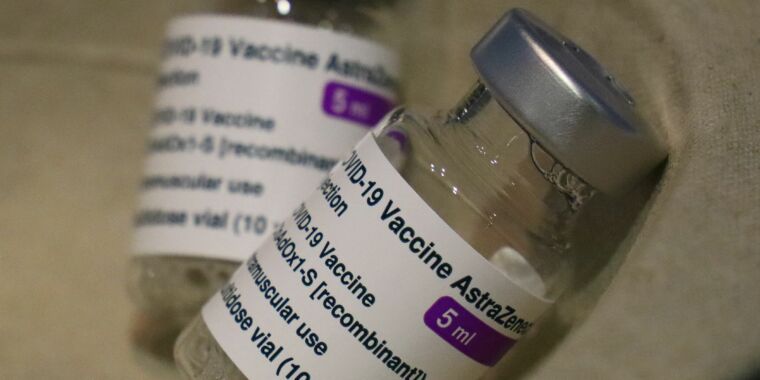
Exceeding expectations, AstraZeneca’s two-dose COVID-19 vaccine appeared highly effective against symptomatic and serious illnesses in a new end-stage study conducted partially in the United States. The company said it is now seeking authorization for emergency use from the Food and Drug Administration. However, the vaccine can still be pursued by doubts.
The Phase III trial conducted in the United States, Peru and Chile found that the vaccine was 79 percent effective in preventing symptomatic diseases, the company said on Monday. Results from previous studies suggest that the effectiveness may be as low as 62 percent.
In the new trial with 32,449 people, two-thirds of the participants received the vaccine, while the remaining third received a placebo. There were five cases of serious illness in the study, all in the placebo group. None of the vaccinated participants required hospitalization.
Notably, the company also found no increased risk of blood clotting events or cases of a rare life-threatening blood clotting event, called CVST, among those vaccinated.
Blood clots
A small number of serious blood clotting events in recently vaccinated people have raised widespread concern in Europe and other countries, where the vaccine has already been authorized for use. In the past week or so, more than a dozen countries – including Germany, France, Italy and Spain – have temporarily halted their launches of the AstraZeneca vaccine, which was developed in collaboration with the University of Oxford.
Among the more than 20 million people who have already received the vaccine in the European Union and the United Kingdom, there have been at least 18 reported cases of CVST (cerebral venous sinus thrombosis), in which a clot prevents blood from draining from the brain, leading to to a stroke. There have also been at least seven other cases of people who have developed blood clots in several blood vessels, a condition called disseminated intravascular coagulation or DIC. Nine of the CVST and DIC cases resulted in death.
Last week, the World Health Organization and the European Medicines Agency independently reviewed all data in detail and, in the end, urged countries to quickly resume use of the vaccine. Both agencies concluded that the risks of serious illness and death from COVID-19 clearly outweighed the extremely rare risk of blood clotting events.
WHO and EMA noted that, among the millions of vaccinees, reports of blood clotting events – which are generally common – were less than expected in the general population. They also failed to establish whether the vaccine caused cases of CVST or DIC. But they were also unable to rule out the possibility, mainly because the majority of cases occurred in people under the age of 55.
In the EMA review, organizations noted:
Based on pre-COVID data, it was calculated that less than 1 reported case of IHD could be expected by March 16 among people under 50 in 14 days after receiving the vaccine, while 5 cases have been reported. Likewise, on average 1.35 cases of CVST could be expected among this age group, while on the same cutoff date there were 12. A similar imbalance was not visible in the elderly population who received the vaccine.
Persistent questions
The new test results found no cases of CVST, but—And if there really is a link – which is not surprising, based on the extremely low frequency of these events. The trial data included safety data for only about 21,500 people vaccinated, while the small number of cases outside the trial occurred among more than 20 million people vaccinated.
Although there is a real possibility that the cases are simply a statistical fluke, some researchers have hypothesized that the vaccine may – rarely – trigger an autoimmune reaction that explains the diseases, and they have suggested possible treatments in this regard. Other researchers have also noted that a link between the vaccine and blood clotting events is not implausible; COVID-19 itself is associated with blood clotting disorders, and research suggests that the SARS-CoV-2 spike protein can activate immune responses that can lead to clotting.
But much more data will be needed to make the connection firmly (if any), as well as finding out how this reaction is triggered by the vaccine and who might be affected. Like other authorized COVID-19 vaccines, the AstraZeneca vaccine delivers cells only the genetic code for the SARS-CoV-2 spike protein, which can train immune responses to target the virus. The vaccine does this using a non-replicating adenovirus as a packaging, similar to the Johnson & Johnson vaccine, which was the last vaccine authorized by the FDA.
For now, the eyes will be on the FDA, which analyzes the data and decides whether to grant a USA. The agency is likely to welcome the new study’s efficacy and safety data and will see the vaccine as another useful tool in the fight against SARS-CoV-2. Still, obtaining public support can be a major obstacle to the vaccine’s advance. In addition to concerns about blood clotting, the vaccine has experienced stumbling after stumbling in its awkward development – from highly publicized trial breaks due to unexplained illnesses and intriguing dosing errors in some participants, to recent data suggesting it may be useless. against light to moderate COVID-19 caused by variant B.1.351.
